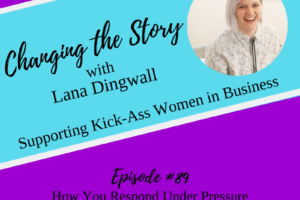I thought this would be a good first post after a few months off, as this is a common theme I find particularly when working with my female clients.
We’ve all heard the expression, ‘ treat others the way you want to be treated’. My question is though, how many of us treat ourselves the way we treat others?
I’m going to throw my mom under the bus here (in the kindest way possible), because she is the perfect example of someone who does not treat themselves the way they treat others. You see, my Mom, like many other people (a lot of the time mothers), very routinely puts the needs of others above her own. Anyone who has ever met my mother (and anyone who knows someone like her) knows that she will bend over backwards to try and accommodate you, she does everything possible to make sure that your life is a little easier, even if that means hers is harder. The reason this is so important is that my mom, and anyone like her, spends so much time helping and caring for others, that she usually doesn’t have any time left over for herself. It’s all about finding balance. Many of us find pleasure, satisfaction and purpose in helping others, but with all things, there needs to be balance. You don’t want to be giving so much to others, that you routinely don’t have anything left for yourself.

Another example would be how some of us are the first people to be called on when others need motivation, encouragement, support, guidance and understanding. However a lot of the time those of us who are the very people who are so good at giving those things to others, haven’t quite figured out how to give the same kind words to ourselves. We should speak to ourselves the way we speak to those around us; with kindness, understanding and support. How many times have you said to yourself things along the lines of, “you’re going to fail”, “you’re just going to mess everything up”, “you’re not smart enough….”. Would you ever say those things to someone you cared about? Exactly. So why do you say those things to yourself?
The purpose of this post is to remind us that we need to treat our own need for time, happiness, understanding, and support with the same type of urgency, dedication and delicacy that we would for someone else. For those of us who are so good at meeting the needs of others, we need to remember our own needs are just as important, if not more.

Here are some introductory tips that I use when working with my clients on this issue:
First and foremost if you feel like you’re being ‘selfish’ for taking time for yourself, you’re doing the right thing. This is something that affects women, and mothers in particular, however it happens to everyone! We often label ourselves selfish if we choose to do something for ourselves at the sacrifice of not doing something for someone else. This isn’t true. We need to learn that not only is it okay, but it is necessary, for our mental health and wellbeing to take time for ourselves. We are not here solely for the use of others. No one but ourselves can make sure that we are given what we need. I’ll say it again: it’s all about balance.
Most of us have heard of the term ‘pay yourself first’. It’s a term used in many financial advice books on how to retire rich/early/have financial freedom. That exact same advice should be applied to ourselves. You should be investing at least 10% of your time and energy into yourself first. Doing this will allow you to retain your mental sanity, and in turn do what you love to do (or need to do) , which is care for and give to others.
Know your boundaries. You are no use to anyone if you are burnt-out and running on empty. Not to mention, burnout severely affects your mental health, physical health, personal relationships, and job.
If you don’t know what those boundaries are (don’t worry most of us don’t), think about that last time you felt burnt-out. What happened leading up to that? What were the possible warning signs? Try to analyze your past events to better understand your boundaries and understand your warning signs.
Don’t be a martyr and remember: saying no doesn’t make you a bad person. Don’t put yourself out over something that can easily be done by someone else or done at another time.
If you notice you are putting yourself down, stop, and replace those negative thoughts with something positive. That’s easier said than done, I know, but the more you start to do this, the more you’ll train your brain to simply cut out that negativity and replace it with the more supportive voice that you often give to others.



